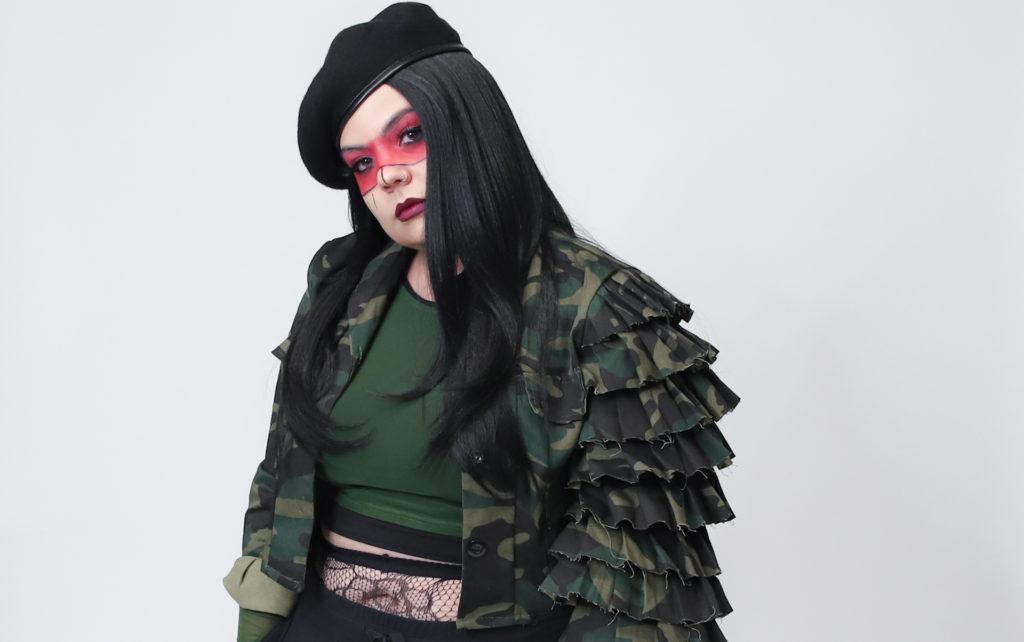
Photo by Jen Vesp
Every week, we’re here to remind you of the local artists we love and think you oughta know.
During the last few years of the Trump administration, the singer, poet, and visual artist Genie Santiago got to know her neighbors better, and not in a good way. “The country didn’t really change,” she says, “People became more openly racist, sexist, and homophobic.” For a queer latina who describes herself as “not rich,” the open hostility towards people who share Santiago’s intersectional identities has felt heavy and scary. Over the summer, Santiago released her single “Revelación” (her first foray from R&B to hip hop) about the colonization of Latinx people and culture, and the fight against white supremacy.
Santiago started writing this track in spring of last year partly in response to the immigrants being detained at the U.S./Mexico border under inhumane conditions. Although Santiago’s Puerto Rican family didn’t have that specific immigration experience, she wanted to acknowledge how this attack on immigrants’ civil liberties isn’t new to 2020, and in fact has been deeply rooted in American history. She says, “One of our top problems [of white supremacy culture] is the idea that people can own things, that they have a right to people’s bodies and this land.”
And those hallmarks of colonization trickle down to the stereotypes ascribed to Latinx people today, as she notes in her “Revelación” lyrics: “They label us seductress, temptress/ Using our bodies over minds/ Exploiting our lives,” and “They wanna build a wall/ Have us work this land/ Clean their homes/ Raise their kids while they dream and plan.” But she counters this with strength and resilience when she raps, “But really we’re revolutionaries,” and “But now we’re speaking in government office/ We’re teachers, doctors, artists, mothers and fathers/ In touch with our roots.” Despite unspeakable hardships, she praises how Latinx folks are “Filled with strength, spirit and grace.”
The community Santiago has built has met her with love and compassion. Listeners have been reaching out to her to say they felt supported for their hurt; they heard themselves and their ancestors in “Revelación.” Santiago wanted this song to be in solidarity with the Black Lives Matter movement as she educated herself about what was happening this summer and processing her feelings. (Another notable lyric is “Police don’t shoot/ (Please don’t shoot).”) Marginalized voices as a whole have been silenced for so long, so it was adding insult to injury when Facebook and Instagram censored her ads for the single, claiming it contained “topics that could influence the outcome of an election.” She responds, “Things like white supremacy are getting through no problem… They’re censoring the truth. It’s not hate speech when people are being murdered in the street.”
Santiago’s music career took off in 2017 when she signed with a talent agency, but more importantly, when she became financially stable enough to even be able to focus on music. “I didn’t have that support other people have, so I had to put music on the back burner. Putting food on the table was at the forefront.”
She released her first EP Know Your Worth in 2018. In hindsight, she admits that she was just writing songs that people wanted to hear. “What you believe five years ago is not what you believe now. I’ve evolved, and as I’ve grown, so did my music.” She created this first project while dealing with a lack of confidence. “You have to feel safe making mistakes to grow,” she says. “Back then, I thought everything coming out of mouth had to be perfect. I wasn’t experimenting. I was relying on producers and managers for how to sound and what to do.”

Photo by Jen Vesp
Santiago attributes her lack of confidence to trauma from her childhood. She grew up in foster care, moving from home to home around Massachusetts. She experienced sexual abuse and assault and didn’t receive help or support to deal with that psychological damage. It’s only been in recent years that she was able to put in the work herself to heal, and that’s partly due to her art.
As a child, Santiago felt silenced and incapable of talking about her trauma. So she turned to literature and it was the first time she experienced a world outside her world. “I wanted to be part of that world that’s healthy and exciting and normal,” she says. Poetry was the first thing she tried to express herself. “I remember handing in a poem in 6th grade and my teacher was blown away by it… I had never really been praised before, and this is something I’m good at.”
In more recent years, Santiago has turned to painting. (Her dad is a musician and visual artist so she says she inherited all of her artistic talents from him.) Painting is more personal and less pressure for her than music, although she recently started sharing her visual art. “Painting is whatever I want to be,” she says. She’s drawn a lot to female anatomy, vaginas, Frida Kahlo, bold colors, and mandalas. Doing so has been part of her healing process to feel comfortable and confident with her body.
“I was never comfortable exploring my own body. I left that responsibility to a lover,” she says. “But in my healing spiritual journey I started four or five years ago, I started to masturbate, figuring out what I like.” Mastubration is one of the focuses of her 2019 single “Spirit Party,” along with meditation, daily affirmations, and other healing self care practices. She says, “I felt I owed it to my body and other women to know it’s okay to touch our bodies and know our bodies before we give it to someone else… Some people don’t have that experience due to genital mutilation or growing up in brothels.”
“Revelación” and “Spirit Party” will be two of the tracks on a forthcoming 2020 album Santiago will release as a newly independent artist. She no longer needs her label to introduce her sound. She has found a voice as her authentic self, and has been able to build community around that. “I think about what music I’m attracted to — why am I trying to be something I’m not? I have this unique voice and I love to rap,” she says. “I’ve grown so much, I know perfection is not real.”
